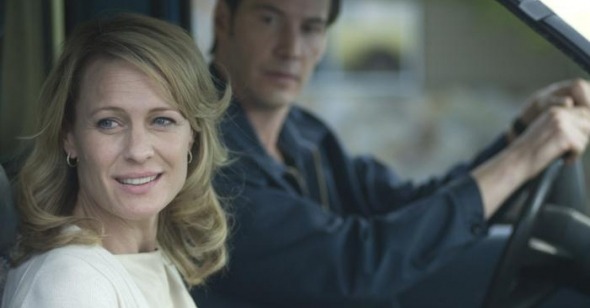Wright and Wrong
by Michael Koresky
The Private Lives of Pippa Lee
Dir. Rebecca Miller, U.S., Screen Media Films
One of contemporary cinemaâs most graceful, taken-for-granted actors, Robin Wright, too long in the shadow of her ex-husband, would seemingly have finally found the perfect leading role in Rebecca Millerâs The Private Lives of Pippa Lee, in which she plays a graceful, taken-for-granted wife and mother. Onscreen, Wright imbues her roles with effortless compassion, which is always just barely peeking out from layers of weariness and insecurity. Her lack of actorly grandstanding has often relegated her to smaller roles, but rather than languish in supporting parts, she thrives, from her one-scene, one-shot wonder in Rodrigo Garciaâs Nine Lives, in which, pregnant and dissatisfied, she comes upon an old flame in a supermarket and runs through a lifetime emotions with the merest flickers in her eyes, to the seemingly thankless estranged-wife role in Shyamalanâs Unbreakable, which in a few scenes she turns into a symphony of regret and doubt. Unfortunately with Pippa Lee this most deserving of actresses has found a role in a film that doesnât deserve her.
The Private Lives of Pippa Leeâs heart is in the right place, but itâs far too stuck in the conventions and clichĂ©s of suburban female liberation narratives to impress as anything other than dutiful and impersonal. Wright plays the titular character, the much younger wife of a successful publisher, Herb (Alan Arkin), who has passively been at her husbandâs side for decades, even now as he moves to a Connecticut retirement community; her friends (including a weepy Winona Ryder) treat her with dull respect, her grown children (among them a nastily self-righteous Zoe Kazan) ignore her, Herb is grateful for her care but ignorant of her needs. Meanwhile, she remains haunted by the memory of her unbalanced, Dexedrine-addicted mother (Maria Bello, emoting to the rafters again). Naturally, the film charts Pippaâs awakening, her realization that she has devoted her life to someone else, and in the process has lost her identity (once troubled, spontaneous, and spunky, as we learn in flashbacks starring Blake Lively as Pippa), something she perhaps can still reclaimâmaybe with the help of her neighborâs drifter son, a studly savior played by Keanu Reeves sporting full-torso Jesus body art.
Itâs that elaborate tattoo, incidentally, thatâs indicative of a larger problem in the film. Adapted by Miller from her own novel, the film reeks of those eccentric novelistic flourishes that most filmmakers would wisely excise from book to screen, which in addition to Reevesâs illustrated chest, includes quirky anecdotes of Pippa being born with a coat of vestigial fur, flashbacks to her experiences as a naughty S&M teen model, and a gratuitous (and clearly truncated) segment with Monica Bellucci as a voluptuous suburban housewife (!) who blows her brains out during an outlandish dinner party. These occasional hiccups of self-conscious idiosyncrasy are matched by Millerâs overdetermined visual palette (sterile, white, full of ennui), by-the-book transitions (flashbacks to her childhood are cued by period doo-wop, wouldnât you know?) and misguided stylistic choices, which range from clunky moving-backwards-in-time effects to poorly placed slow-motion, to, seriously, a brief animation fantasy.
Such decisions show not only a certain lack of aesthetic unity and sophistication but also severely detract from what should be the filmâs unerring focus: Robin Wright. Sheâs perhaps not entirely convincing as a dowdy or dismissible housewife, but the actress brings so much charisma and inner spirit to Pippa that all the other characters orbiting around her just seem false contrivances in comparison, especially Reeves as the loner, the only one who really âgetsâ Pippa, and Ryder, with her distraught pixie routine. Also Wrightâs talent and presence naturally makes dialogue like âShe is a mystery, an enigma!â and Pippaâs own explanation that âOur marriage functions because we will it toâ utterly redundant, yet novelist-filmmaker Miller feels the need to spell out every last inner thought and emotion. If only Miller had just trusted Wrightâs subtly expressive face as her filmâs only necessary effect.
This article originally appeared on indieWIRE.com.
